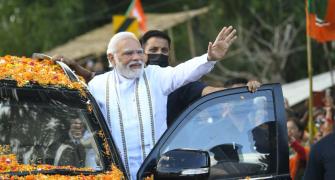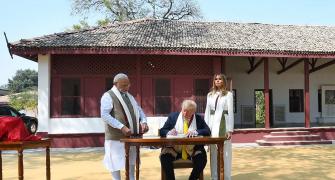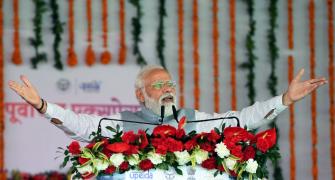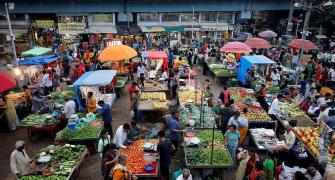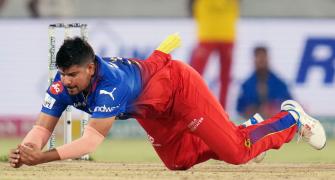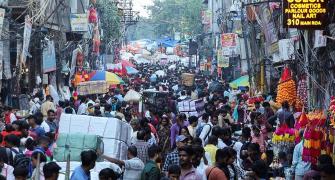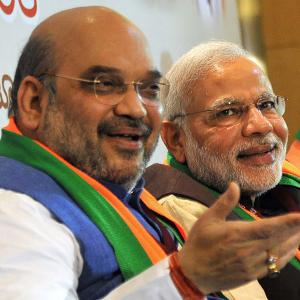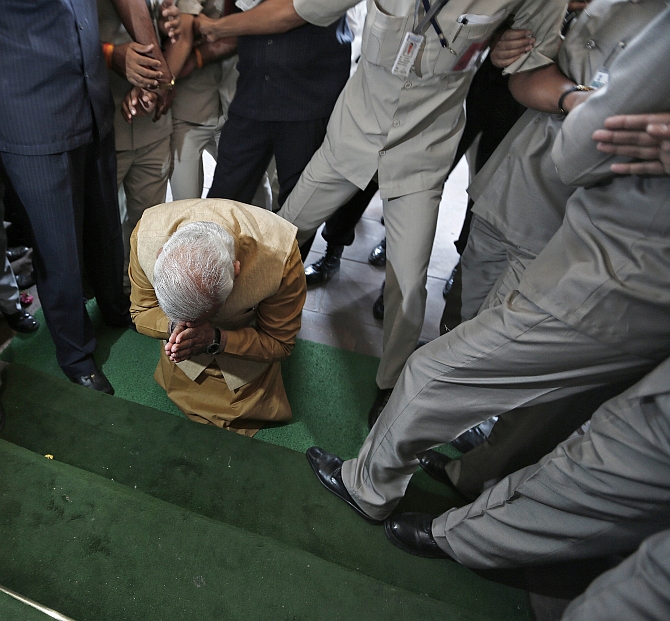'It was more than ego.'
'It carried with it a sincere belief that he was the quintessence of the country, that the country's destiny was irrevocably intertwined with his destiny.'
An excerpt from T J S George's The Dismantling of India: In 35 Portraits.

One fine morning, railway tickets and Air India's boarding passes began to be issued with Narendra Modi's photograph displayed on them.
Additionally, the Civil Aviation Ministry instructed airlines to distribute to each passenger a note describing the achievements of the Modi government.
This was something no Prime Minister of India or of any democracy had done before. The in-your-face publicity blast offended most citizens.

'My Air India Boarding Pass, prominently flashes Narendra Modi, Vibrant Gujrat" & Vijay Rupani.
'Picture of boarding pass is below.
'Wonder why we are wasting public money on this Election Commission, which doesn't see, hears or speak', tweeted Shashi Kant IPS. Photograph: Kind courtesy @shashikantips54/Twitter.com
An Air India passenger, a former director general of police, tweeted a photograph of the boarding pass with the comment: 'Wonder why we are wasting public money on this Election Commission which doesn't see, hear or speak... An Air India official explained that the boarding passes were only carrying a third-party advertisement'.
Following a Trinamool Congress complaint, Indian Railways stopped selling tickets that carried the Gujarat government's advertisements of Modi's photograph.
Clearly, Modi nurtured a desire to show that he was bigger than the circumstances that made him.

The young OBC leader, Alpesh Thakor, said in 2017 that he 'had heard' that Modi liked mushrooms from Taiwan that cost Rs 80,000 a piece.
India Today carried out a fact-check and said, yes, he liked mushrooms but the Himalayan Guchchi variety, which cost only Rs 30,000 a kilogram.
Modi never tried to hide his perception of himself as the leading symbol of the nation.
He told The Times of India in 2019: 'It is to BJP's credit that it has gone to the people in the name of the Modi government's track record, and unlike the previous governments, the party is not afraid to ask for votes in the name of its leader.'
Although it presented a flattering estimate of himself, Modi got the facts slightly re-arranged.
The Congress always asked for votes in the name of Jawaharlal Nehru, or of Indira Gandhi and, following an unexpected if short-lived shift in history, in the name of Narasimha Rao.
It did not ask for votes directly in the name of Rahul Gandhi, but the fact that he was in the forefront of things and that Priyanka Gandhi, too, appeared in the forefront when the mood seized her showed that they were in fact asking for votes in the name of Gandhi.

Modi's concept of power was generally seen as self-centred and autocratic. He equated his progress and pre-eminence with the country's progress and pre-eminence.
It was more than ego. It carried with it a sincere belief that he was the quintessence of the country, that the country's destiny was irrevocably intertwined with his destiny.
What was on display here was the phenomenon known as the cult of personality, the moment when 'a national leader tries to achieve, by using techniques of mass media propaganda, the big lie, using spectacle, the arts, patriotism and government-organised demonstrations and rallies to create an idealised, heroic and worshipful image of himself.'
It was this cult of personality that led to Air India and Indian Railways issuing tickets with Modi's photograph on them.
Instructions were given to Bharat Petroleum and Indian Oil to display pictures of Narendra Modi at retail petrol pumps ahead of the 2019 elections.
These pictures are still displayed at many petrol stations although 2019 came and went.
Perhaps they are still reeling under the threat held out that year, that 'those who refuse would have their supplies blocked'.

It occurred to no prime minister other than Modi that drama could be created by his doing a sashtanga namaskar on the steps of Parliament on his maiden visit as prime minister in May 2014.
It was a gesture of accepting the paramountcy of Parliament. But it ended with the gesture.
Modi made a convenience of Parliament in moments of crisis. He simply cancelled the winter session in 2020 citing COVID-19 as an excuse.
This helped him avoid parliamentary scrutiny of some of his policy initiatives.
As a critical commentator put it: 'Ambedkar felt that nobody could be as disdainful of the legislature as the British. Modi proved him wrong.'

Everything about Modi was showmanship, drama.
The brouhaha over his education was typical. He could have said that circumstances did not allow him to go to university and no one would have thought the less of him for that.
Karunanidhi was a Class 10 pass while Jayalalithaa was just a matriculate.
Modi has once said that he was 'undereducated' and 'never went to college'. But he changed his stance later for reasons unknown. He said he had a BA from Delhi University (School of Opening Learning) and an MA in 'entire political science' from Gujarat University.
The politics of these claims was laid open when Arun Jaitley and Amit Shah appeared before television cameras in May 2016 showing computer-generated mark sheets of Modi, a facility that was technologically not possible during Modi's presumed university days.
RTI activist Neeraj Sharma's attempt to get full details (list of students, roll numbers, marks obtained) was blocked by Delhi University.
Court cases followed, leading to various legal complications. Normally, DU publishes examination results in detail online.
In 2017, Central Information Commissioner Acharyulu ordered DU to allow inspection of records.
Acharyulu was divested of his charge of the HRD ministry.
The to-ing and fro-ing turned it all into a farce with many saying that Modi was in fact an 8th standard pass (his 10th standard is disputed).
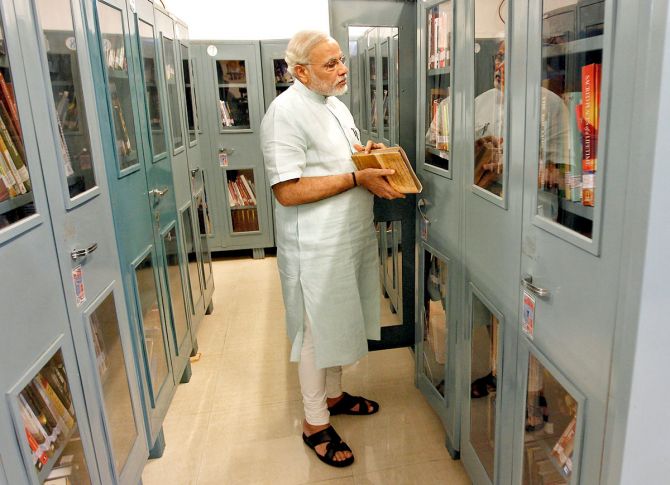
Some anti-national conspiracy has prevented the world from knowing that Narendra Modi was in fact an author of many books.
Jyotipunj (2008), Social Harmony (2012), A Journey: Poems (2014), Abode of Love (2018), Exam Warriors (2018), Letters to Mother (2020) are only some of the tomes written by this felicitous author.
Evidently, he not only has a creative mind with a literary bend; he also has the time to sit back and look at the sky like poets do, deriving inspiration from the clouds that pass gently by.
The books on Modi by admirers outnumber the books by him.
They range from Narendra Modi: Yes, He Can (2012) by D P Singh and Narendra Modi: The Game Changer (2014) by Sudesh Verma to Narendra Modi: The Architect of a Modern State (2009) by M V Kamath and Modi: The Making of a Prime Minister (2014) by Vivian Fernandes.
So many books saying so many wonderful things about Modi must have been the reason for Prakash Javadekar, a BJP minister, to say that 'India's prestige has risen since Modi became prime minister.'

Unfortunately, the outside world thought that India's prestige had collapsed. And it said as much.
In December 2019, the New Yorker magazine wrote: 'Is the World's Largest Democracy Doomed? As Prime Minister Narendra Modi consolidates his power, dissenting voices were being quashed by disinformation, threats, and violence.'
In 2015 a TIME magazine cover had discussed the subject, 'Why Modi matters'. Four years later, in 2019, the same magazine ran a cover feature under the title 'India's Divider in Chief'.
A Financial Times (London) story carried the headline 'India risks sliding into a second Emergency'.
Even the leading daily of Israel, a country the Modi government admires, was unsparing. Said Haaretz: 'India under Modi is becoming a brutal authoritarian state. It ran a story on how India's 'Hindu nationalists hijacked Gandhi'.
In a feature/article headlined 'India's democracy in decline,' the Washington Post wrote that the future of the world's largest democracy is looking increasingly less democratic.
It said Narendra Modi was the most dominant Indian leader in five decades, but added that the country's independent institutions have rarely appeared weaker.
Without mincing words, it said: 'Much of the local mainstream media shies away from criticising the government.
'The judiciary seems reluctant to examine the constitutionality of major pieces of legislation.
'Government critics have faced intimidation, harassment and arrest.
'Academics who study democracy around the world recently put India in the category of nations moving toward autocracy.'
International agencies of high standing have also found recent Indian moves unacceptable.
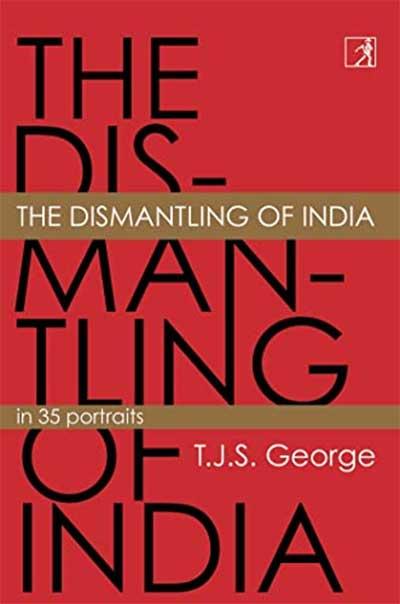
The UN High Commissioner for Human Rights urged India to release arrested activists. The way the prestigious London magazine, The Economist, changed its views was dramatic.
In 2010, it had run a cover story holding up India as a model to others.
Its headline said: 'How India's Growth will outpace China's'.
In 2020, its cover picture showed a lotus perched on a barbed-wire coil with the heading 'Intolerant India: How Modi is Endangering the World's Biggest Democracy'.
No anti-Modi prejudice could have been the reason for this.
When Modi began his reign in 2014, the magazine's cover story had trumpeted: 'Strongman. How Modi can unleash India'. Well, Modi could, but Modi didn't.

In six years of Modi government, India's GDP contracted for the first time in four years.
Unemployment reached an all-time high. Private investment went down, as did exports. The government's spending capacity was also reduced.
In February 2021, The Economist Intelligence Unit downgraded India from 27th in 2014 to 53rd on the Democracy Index. It called India a flawed democracy.
It said the Modi government introduced a religious element to the conceptualisation of Indian citizenship' which led to 'undermining the secular basis of the Indian state.
But Modi seemed unconcerned by readings of this kind. His usual stance was to dismiss protestors as conspirators.
Money continued to be the deciding factor in most issues.
While observers saw signs of Indian democracy declining because of the greed for money, Indian politicians saw it as a factor that strengthened their game.
What others considered cynical, Indian politicians perceived as practical.
The BJP's ways might have been resented by many, but its hold on power enabled it to ignore them.
The 21-day lockdown announced with four hours' notice in March 2020 was a disaster by all accounts.
But Modi never expressed regret for the misery of millions that followed: Power made him confident that there was no need for him to apologise to anyone about anything.
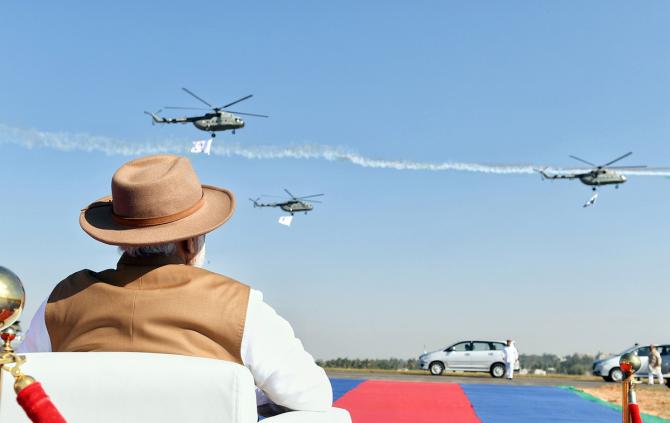
The Modi saga made people in Karnataka recall a folk song popularised by Gururaj Hoskote. It was all about a mother's pride for her son.
Instead of bearing ten children, I gave birth to one, a pearl;
At 6 he hit his guru for trying to discipline him;
At 9 he pushed a friend into the well:
At 14 he robbed a neighbour of his jewellery;
At 22 he went to jail for murder;
At 42 my pearl became Mukhya Mantri.
Excerpted from The Dismantling of India: In 35 Portraits by TJS George, with the kind permission of the publishers Simon & Schuster India.
Feature Presentation: Ashish Narsale/Rediff.com

